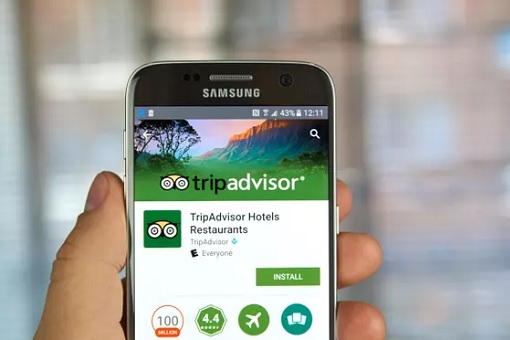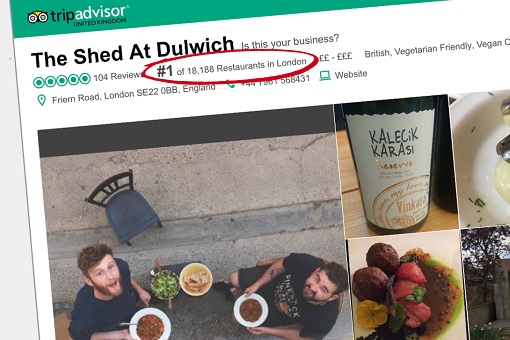Almost all of travellers would seek online opinions before making a decision to splash money on a trip, or even on breakfasts offered by certain hotels. That’s when they go and read reviews. Holidaymakers would most often than not influenced by positive reviews. Unfortunately, not all reviews are genuine – up to a third (33%) of positive reviews has been found to be fake.
If you’re one of millions of tourists depending on reviews or comments from website TripAdvisor, you probably have been or will be cheated if those good reviews are taken as gospel truth. Fakespot.com, a website that seeks to weed out bogus reviews, claims that up to a third of reviews posted on TripAdvisor are not legitimate.
Fakespot founder Saoud Khalifa said – “I would advise TripAdvisor users to approach each review with scepticism. TripAdvisor has a huge set of problems. From our database, the mean of fake reviews is 32.9%. For B&Bs (bed and breakfast), that rises to 41.9%.”

It’s a big business for TripAdvisor as it gets more than 50 million visits a month from users in Britain alone. And it has been estimated that its reviews influence how £14 billion (US$18.3 billion; RM75.6 billion) is spent annually on hotels and travel. But Fakespot isn’t the only one who believes TripAdvisor has been rigging its reviews to cheat or scam tourists.
According to an undercover operation by UK’s The Times, tens of thousands of reviews on the world’s best-known travel website shows that supposedly top-rated bed and breakfast hosts at tourist hotspots have almost twice as many “fake” reviews as lower-ranked accommodation. Two thirds (66%) of reviews posted about top B&Bs in some hotspots are thought to be suspect.
Positive reviews could cost up to £38 (US$50; RM205) a pop but for bulk purchase, it could go for as low as £69 (US$90; RM372) for10 positive reviews. One restaurant owner was revealed writing to a website offering fake reviews – “I’m looking to improve my TripAdvisor account, I’m currently 3.5 [out of five] and would like to be 4.5 in the next month, please let me know if you can help.”

TripAdvisor, of course, has rubbished and denied such allegations, saying – “We totally reject the inaccurate and misleading findings presented by The Times. Their claims about fake reviews on TripAdvisor are astonishingly bad ‘click bait’ journalism. The usefulness and accuracy of the content on TripAdvisor is what has made our site popular to hundreds of millions of consumers.”
“We’ve never lost sight of that and it’s why we fight fraud so aggressively. Learn more about how we do that here. The Times investigation is based on entirely flawed techniques. The methods used by Fakespot are completely unreliable for one simple reason: they have no access to the technical data you would need to determine whether or not a review is fake,” – claimed TripAdvisor.
Deeply angered by the exposure, TripAdvisor counterattacked – “We have tested Fakespot analysis, with reviews we know to be either genuine or fake, and the results show it to be completely unreliable and inaccurate. We are the experts in catching fake reviews, not Fakespot. Their business model is dependent on convincing users that review sites cannot be trusted. Our site is built on trust.”

Responding to TripAdvisor’s retaliation, a Fakespot spokesman said – “Fakespot’s mission is to bring trust and transparency back to the Internet and improve the consumer experience on sites where we analyse reviews, including TripAdvisor. If our service saves only one consumer from booking a holiday based on fake reviews then we have done our job.”
“Contrary to TripAdvisors claims, we have access to all of the technical data we need to give consumers a reliable Fakespot Grade of reviews on TripAdvisor. Furthermore, to express that we are not experts in catching fake reviews is not supported by the fact that we are trusted by millions of users to spot fake reviews on Amazon, Yelp, TripAdvisor and the Apple App Store,” – said Fakespot.com
Interestingly, another survey by the British Hospitality Association also found that more than half of British hoteliers believe TripAdvisor is “not very helpful at all” at dealing with malicious content. While no company has been taken to court in the UK over fake reviews, the owner of a firm that sold fake TripAdvisor write-ups in Italy was jailed for nine months.

The owner of Promo Salento, a tourism company, was convicted of selling fake reviews to hundreds of hospitality businesses across Italy in order to raise their profile on TripAdvisor. He was also ordered to pay €8,000 (US$9,384; £7,186; RM38,800). It was the first time a paid-review fraud has resulted in a jail sentence.
Other Articles That May Interest You …
- Planet’s Top-20 Ultimate Best Food – Malaysia Hawker Food “Curry Laksa” Ranks 2nd Place
- China Threatens U.S. Airlines – Recognize “One-China” Rules Or Risk Losing Business
- Top-5 Simple Secrets That Make Singapore Changi The World’s Best Airport
- Secrets Revealed – TIPS To Get A Free First Class Flight Upgrade
- Here’re 20 Dirty Secrets The Airlines Don’t Want You To Know
- Top-15 Best & Luxurious First Class Amenity Kits From Airlines Around The World
- Secret Revealed – The Secret Chambers Where Pilot & Cabin Crew Rest & Sleep (Photos)

|
|
September 23rd, 2018 by financetwitter
|


|

|

|

|

|

|




























Comments
Add your comment now.
Leave a Reply